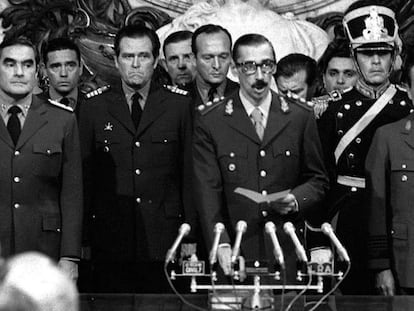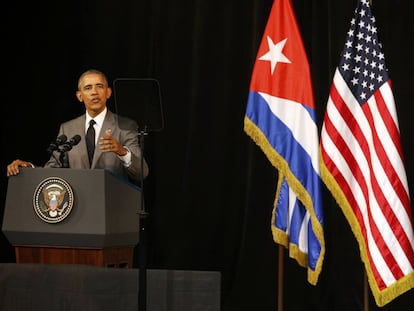Obama asks Argentineans for an end to long history of mistrust
US president promises to declassify files from the dictatorship during Buenos Aires visit
Barack Obama wants to end his presidency by effecting a radical change in the way Latin America views the United States.
Speaking in Buenos Aires on the 40th anniversary of the beginning of a terrible dictatorship that was initially supported by the US, the American president asked for an end to the mistrust created by this past, and said his country long ago “learned the lesson” that human rights had to be a priority of its own foreign policy.
Obama arrived in Argentina after a trip to Cuba that he himself defined as “historic.” And from the very beginning, he tried to make history here as well, as the first US president to visit the country in 20 years.
There is no shortage of self-criticism in the United States. Certainly no shortage of criticism of its president or its government or its foreign policy
US President Barack Obama
As a gesture to Argentinean human rights activists, who have been highly critical of him, Obama noted that he has decided to declassify military records from the era a full 10 years before the 50-year period set by US law, and asked for an end to the Latin American left’s traditional “mistrust” of the United States.
Without fully criticizing the US role in Latin American dictatorships or mentioning any names – especially not that of controversial former state secretary Henry Kissinger – Obama did send out a clear message to victims, and to all Latin America, that the US is no longer the same country that used to invade the continent or used the CIA to influence regional coups.
“I have spent a lot of time, both before I was president and since I’ve been president, studying the history of US foreign policy. And like the history of any country’s foreign policy, there are moments of great success and glory, and there are moments that were counterproductive or contrary to what I believe America should stand for,” said Obama in reply to a question about US self-criticism over the 1970s dictatorship in the region.

“I think one of the great things about America – and I said this in Cuba – is we actually engage in a lot of self-criticism. There is no shortage of self-criticism in the United States. Certainly no shortage of criticism of its president or its government or its foreign policy,” he added.
Obama insisted at all times that the US changed its foreign policy a long time ago in order to embrace human rights.
“I made a historic trip to Havana, and I said the people of Cuba have nothing to fear from me, but you should know what I really believe. I believe that democracy is better than a one-party or one-person dictatorship. I believe in freedom of speech and freedom of assembly, and that people shouldn’t be arbitrarily detained. And I say the same thing when I’m in China or in Russia, or with some of our allies in ways that are uncomfortable,” he said.
We all have a right to know the truth
Argentinean President Mauricio Macri
Standing next to Obama, an elated Mauricio Macri, whom this visit establishes as a regional leader, expressed gratitude for the decision to release intelligence files.
“We all have a right to know the truth,” said the Argentinean president.
Obama and Macri were scheduled to pay a joint tribute to the victims of the dictatorship on Thursday, in a new gesture towards human rights groups that are, in any case, not planning to attend.
English version by Susana Urra.
Tu suscripción se está usando en otro dispositivo
¿Quieres añadir otro usuario a tu suscripción?
Si continúas leyendo en este dispositivo, no se podrá leer en el otro.
FlechaTu suscripción se está usando en otro dispositivo y solo puedes acceder a EL PAÍS desde un dispositivo a la vez.
Si quieres compartir tu cuenta, cambia tu suscripción a la modalidad Premium, así podrás añadir otro usuario. Cada uno accederá con su propia cuenta de email, lo que os permitirá personalizar vuestra experiencia en EL PAÍS.
¿Tienes una suscripción de empresa? Accede aquí para contratar más cuentas.
En el caso de no saber quién está usando tu cuenta, te recomendamos cambiar tu contraseña aquí.
Si decides continuar compartiendo tu cuenta, este mensaje se mostrará en tu dispositivo y en el de la otra persona que está usando tu cuenta de forma indefinida, afectando a tu experiencia de lectura. Puedes consultar aquí los términos y condiciones de la suscripción digital.
More information
Archived In
Últimas noticias
Trump claims peace in Ukraine is near, but Moscow suggests otherwise
A survivor’s account of the Interoceanic Train accident: ‘We were scared because of the speed on the curve’
The Interoceanic Train, the Mexican alternative to the Panama Canal
What is known about the Interoceanic Train derailment in Oaxaca
Most viewed
- Oona Chaplin: ‘I told James Cameron that I was living in a treehouse and starting a permaculture project with a friend’
- Reinhard Genzel, Nobel laureate in physics: ‘One-minute videos will never give you the truth’
- Why the price of coffee has skyrocketed: from Brazilian plantations to specialty coffee houses
- Pablo Escobar’s hippos: A serious environmental problem, 40 years on
- Chevy Chase, the beloved comedian who was a monster off camera: ‘Not everyone hated him, just the people who’ve worked with him’











































